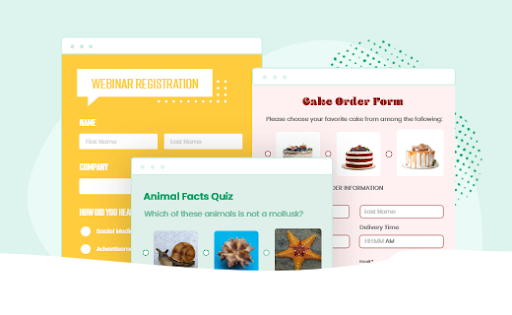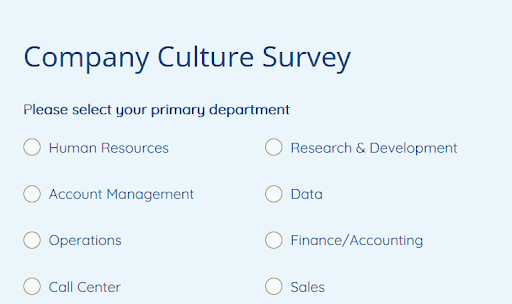Online survey tools are essential to help you conduct successful surveys; they save you time, expand your reach and offer in-depth feedback on your surveys.
However, with many options in the market, selecting the best online survey tool can be a daunting process.
So, in this article, we discuss how you can find the best online survey tool using five actionable tips.
Let's get into it.
5 Tips to follow when choosing the best online survey software
Finding the right online survey software may not be easy, but putting certain factors into consideration can help you make the best pick. Below are five tips for selecting the best online survey tools for your needs.
1) Figure out what you want
The first step to selecting the best online survey software is to know what your expectations are. What type of survey do you want to create? What features are necessary to make this happen?
Answering these questions can help to determine the type of survey tool you will need. You will also know the type of features to look out for when selecting your tool to ensure it serves the purpose you want it to serve.
2) Examine its functionality
Functionality is a crucial aspect to consider when selecting your online survey tool. You need to know if the software can perform the required functions and do so efficiently.
Many excellent survey tools often come with additional features to complement their primary functions.
So, looking out for this type of tool can help you enjoy other benefits that could aid your online survey creation and delivery.
For example, some excellent online survey tools come with a logic and branching feature that allows the answer to one question to change based on the first question asked.
For example, if the first question asks your recipient if they've used your product before, and the second question was for them to narrate their experience, the logic and branching features may change the second question if their answer to the first question is “no.”
Additionally, online survey tools with the offline survey collection feature allow you to gather surveys offline and integrate them online.
There is also some survey software that lets you carry out surveys on devices without connecting to the internet. You can then sync these results later with an internet connection. These unique features facilitate your survey collection process by enabling you to conduct better-tailored research for your audience.
You can also conduct research both online and offline, with or without connection to the internet, thereby enhancing your survey process and making it flexible for you and your respondents.
3) Consider your budget
Creating a specific budget can guide you on a suitable online survey tool to purchase. The type of budget to settle for depends on your needs and the duration you want to use it for. Do you want to use it for a short period? A one-off? Or on a consistent and regular basis? Figuring out answers to these questions will help you choose the best plan for your unique needs.
For example, some providers offer monthly contracts; some offer pay-as-you-go contracts, while others offer annual contracts. The type of contracts you go for depends on how long you plan to use the service.
Additionally, check for how many responses are included in the plan you want to choose. If you expect several responses from your survey, then you would have to go for a plan that accommodates the number of responses you want to receive.
While you keep these factors in mind, know that the best survey tool for your business should suit your budget and provide real value for its price. You could also go for a free option like Jotform Survey Maker and learn all about how to create a survey.
4) Go for tools with customizable features
Branding is an essential part of every survey.
While you distribute your surveys on several platforms, you want to ensure every survey portrays your brand identity and reveals its personality to the recipients; which is why opting for a survey tool that allows you to customize the survey to suit your brand's taste is essential.
Survey tools with customizable features allow you to insert your brand's logo, fonts, and colors to represent your brand.
By doing this, your recipient can attach your brand's personality to the surveys, which can boost your brand's awareness and keep your brand memorable in their minds.
5) Create your online survey

After you've considered these factors and selected an online tool that meets your expectations, the next step is to create your own online surveys.
You can create your online survey by exploring the several survey forms your software provides and customizing them to suit your needs. You can also get help from the WP Survey Plugin.
Excellent survey software comes with several templates in different categories. You only have to select a category that is most related to the survey you want to carry out and tweak it to fit into the purpose you want to perform.
Keep your surveys short, relevant, and tailored to your audience. This goes a long way in increasing its response rate. It also influences how accurate the data you will acquire from your survey will be.
What to look out for in an online survey software

Now that you've figured the factors to consider when selecting the best survey tool, what exactly do you look out for to ensure you purchase an excellent online survey software? Let's find out below:
1) Branching logic feature
Branching logic feature is an important feature for functional online survey software. They place relevant questions in front of your users, so they can give accurate, relatable answers when filling your survey.
Rather than let your respondents answer generalized questions, a survey tool with this feature shapes each respondent's questions based on the questions they've answered to provide tailored experiences when filling your forms.
2) Accommodate different questions and answers format
An excellent online survey tool allows you to ask respondents questions in different formats. It also allows your respondents to give feedback in different formats.
For example, if you want to structure your questions in multiple choices, unique choice, drop-down answer, small or large answer text, your survey tool should allow you to construct your questions in these ways.
3) Segmentation
Data Segmentation is another top feature to look out for when selecting the right survey tool. This is because all your respondents share unique experiences with your brand and have unique perceptions of situations, so it's critical that your survey is tailored to them individually.
First, your survey tool should tailor your surveys based on your respondents to their geo-location by asking questions specific to respondents in a specific city. Also, it can segment them based on their conversion status.
For example, you may ask customers who have purchased your products different questions to leads who are yet to buy from you.
4) Multiple languages
Your online survey tool should be able to deliver in multiple languages to accommodate different audiences.
For example, if you have a large segment to distribute your surveys to, perhaps, to a global audience, you will need an online survey tool that can translate your surveys to other languages.
5) Frequency
An excellent survey tool provides a frequency feature that allows you to schedule how often your respondents will receive your surveys.
This is because popping your surveys too frequently in your audience's faces could be a turn-off, and by creating a specific structure or schedule, your surveys can be less invasive.
So, your ideal survey software should come with a feature that lets you set the times you want your audience to see and fill your survey.
6) Advanced reporting
An efficient survey tool provides accurate reporting that gives insight into the results of your survey. It should reveal the number of respondents opening, filling, and ignoring the survey. This will allow you to track the progress rate and also figure out what you can do to improve the open rates and get expected results with your survey.
7) Easy-to-use
Any excellent survey tool should be simple and straightforward to use. It should come with an intuitive interface that allows you to carry out tasks quickly and without a hitch. It should offer a seamless onboarding process with a simple learning curve so you don't have trouble getting started.
8) Support
Your survey tool should offer a reliable support team to troubleshoot any issues you may have when using the tool.
Its support team should be responsive and provide timely troubleshooting services to aid your experience. So, when purchasing your survey tool, research the brand's support system and evaluate their reviews to measure how reliable they are.
Conclusion
Online survey tools are excellent at enhancing your productivity by automating your survey process.
They also provide great reporting benefits that allow you to measure your survey's progress and make good marketing decisions.
In this article, we discussed the top five tips for picking an effective online survey software. We also discussed crucial factors to consider when making your purchase. Use these tips to select the best online survey software for your needs.















Leave a Reply